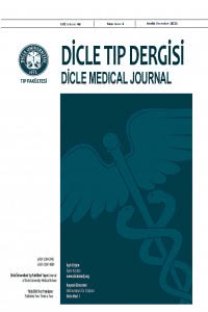Comparison of oral capecitabine alone versus platinum combinations in elderly metastatic gastric cancer patients
Yaşlı metastatik mide kanserli hastalarda tek başına oral kapesitabin ile platin kombinasyonlarının karşılaştırılması
___
1. Siegel RL, Miller KD, Jemal A. Cancer Statistics, 2017. CA Cancer J Clin. 2017 Jan; 67: 7-30.2. Wils JA, Klein HO, Wagener DJ, et all. Sequential highdose methotrexate and fluorouracil combined with doxorubicin—a step ahead in the treatment of advanced gastric cancer: a trial of the European Organization for Research and Treatment of Cancer Gastrointestinal Tract Cooperative Group. J ClinOncol. 1991 May; 9: 827-31.
3. Kim NK, Park YS, Heo DS, et al. A phase III randomized study of 5-fluorouracil and cisplatin versus 5-fluorouracil, doxorubicin, and mitomycin C versus 5-fluorouracil alone in the treatment of advanced gastric cancer. Cancer. 1993 Jun 15; 71: 3813-8.
4. Wang J, Xu R, Li J, et all. Randomized multicenter phase III study of a modified docetaxel and cisplatin plus fluorouracil regimen compared with cisplatin and fluorouracil as first-line therapy for advanced or locally recurrent gastric cancer. Gastric Cancer. 2016 Jan; 19: 234-44.
5. Kaufman PA, Awada A, Twelves C. Phase III openlabel randomized study of eribulinmesylate versus capecitabine in patients with locally advanced or metastatic breast cancer previously treated with an anthracycline and a taxane. J ClinOncol 2015; 33: 594–601.
6. Ishikawa T, Utoh M, Sawada N. Tumor selective delivery of 5-fluorouracil by capecitabine, a new oral fluoropyrimidine carbamate, in human cancer xenografts. Biochem Pharmacol 1998; 55: 1091–7.
7. Kim TY, Oh DY, Bang YJ. Capecitabine for the treatment of gastric cancer. Expert Rev Gastroenterol Hepatol. 2015; 9: 1471-81.
8. Ina K, Ina H, Yoneda M, et all. A retrospective analysis of chemotherapy for gastric cancer in later-stage elderly patients. Nihon Ronen Igakkai Zasshi. 2018; 55: 244-50.
9. Trumper M, Ross PJ, Cunningham D, et all. Efficacy and tolerability of chemotherapy in elderly patients with advanced oesophago-gastric cancer: A pooled analysis of three clinical trials. Eur J Cancer. 2006; 42: 827–34.
10. Jatoi A, Foster NR, Egner JR, et all. Older versus younger patients with metastatic adenocarcinoma of the esophagus, gastroesophageal junction, and stomach: a pooled analysis of eight consecutive North Central Cancer Treatment Group (NCCTG) trials.. Int J Oncol. 2010; 36: 601-6.
11. Tan HL, Chia CS, Tan GHC, et all. Metastatic gastric cancer: Does the site of metastasis make a difference? Asia Pac J ClinOncol. 2019 Feb; 15: 10- 17.
12. Gasparini G, Inelmen EM, Enzi G, et all. Clinical and prognostic aspects of gastric carcinoma in the elderly. J Gastrointest Surg. 2006; 10: 395–401.
13. Deans C, Yeo MS, Soe MY, et all. Cancer of the gastric cardia is rising in incidence in an Asian population and is associated with adverse outcome. World J Surg. 2011; 35: 617–24.
- ISSN: 1300-2945
- Yayın Aralığı: Yılda 4 Sayı
- Başlangıç: 1963
- Yayıncı: Cahfer GÜLOĞLU
Bruselloz Hastalarında Asimetrik Dimetilarjinin (ADMA) Düzeylerinin Araştırılması
Muhammed SEZGİN, MERVE AYDIN TERZİOĞLU, FARUK KARAKEÇİLİ, Aytekin ÇIKMAN, Barış GÜLHAN, YUSUF KEMAL ARSLAN
Mehmet ŞEKER, Oktay OLMUŞÇELİK, Naciye Çiğdem ARSLAN, Pelin BASIM, İrem ÖZÖVER, Yaşar ÖZDENKAYA, Cenk ERSAVAŞ
Negatif Basınçlı Pulmoner Ödem: Olgu Sunumu
Barış ÇİL, İclal HOCANLI, Mehmet KABAK
Ocular and Systemic Safety of Mirabegron Treatment in Elderly People with Overactive Bladder
İntradermal Nevuse Eşlik Eden Olağan Dışı Histopatolojik Bulgular: 2640 Vakanın Retrospektif Analizi
Stomach metastasis of low grade endometrial stromal sarcoma
Serdar KIRMIZI, Bercis Imge UCAR, DEMET AYDOĞAN KIRMIZI, SEVDA YILMAZ
Sağlık Alanında Kullanılan Kantitatif Yöntem, Stereoloji
Hatice DÜLEK, Zeynep TUZCULAR VURAL, Işık GÖNENÇ
Outcomes of Maximal Levator Resection Procedure in Cases of Congenital Myogenic Ptosis
Selahattin BALSAK, Umut DAĞ, Yakup GÜNEŞ, Sevim ÇAKMAK, Uğur KEKLİKÇİ
Pektus Bar’lı Olguların Serum ve İdrar Örneklerinde Eser Elementlerin Değerlendirilmesi
